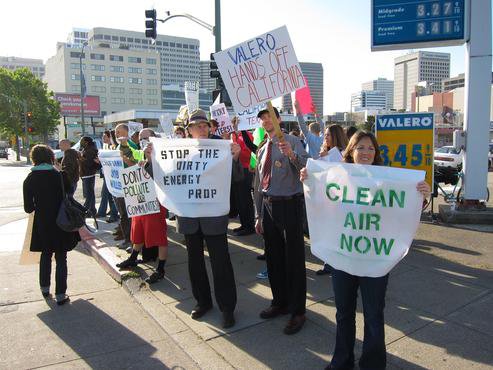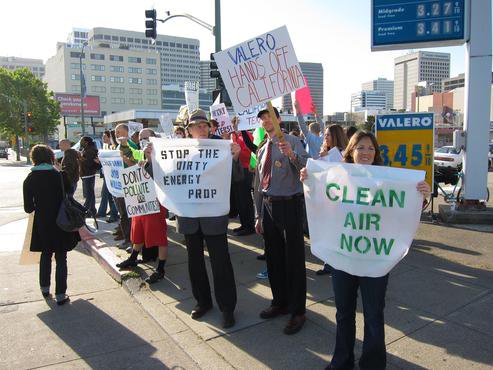 Like these protestors, California’s clean tech industry opposes Prop 23 — and it’s bankrolling the No on 23 campaign.Photo: NRDCThe climate war has shifted to California.
Like these protestors, California’s clean tech industry opposes Prop 23 — and it’s bankrolling the No on 23 campaign.Photo: NRDCThe climate war has shifted to California.
Proposition 23, an initiative that would suspend Assembly Bill 32 (AB 32), the state’s landmark global warming law, provides the first ballot box test for climate change legislation — and for the prospects of reviving a national cap-and-trade bill.
So far, much of the media attention has focused on Prop 23’s funding. It’s being underwritten by the Texas oil companies Tesoro and Valero along with other mostly out-of-state petrochemical and fossil fuel interests. Prop 23 supporters have contributed more than $6.5 million to the campaign.
But a review of opposition fundraising — for the No on 23 campaign — offers a revealing look at what amounts to a fight for the future, a struggle between the industrial behemoths of the old fossil fuel economy and a startup coalition of environmental groups, Silicon Valley technology companies, financiers, and old-line corporations looking to profit from decarbonizing California.
“The choice that is before California is between the new clean economy versus the dirty old economy,” says Annie Notthoff, California advocacy director for the Natural Resources Defense Council. “The Silicon Valley folks who are willing to invest in the new clean energy economy with their dollars are tangible evidence that this is an economic issue as well as an environmental one.”
The NRDC has emerged as one of the key fundraisers, funneling more than a million dollars to the No on 23 campaign to date. Big green groups such as NRDC and the Environmental Defense Fund took the lead on forging alliances with Fortune 500 companies in the unsuccessful effort to pass national climate change legislation. In contrast, the heavy hitters in California’s Prop 23 battle are green tech entrepreneurs and venture capitalists, who have traditionally shied away from electoral politics.
The last stand for climate change has brought John Doerr, a leading green tech investor with Kleiner Perkins Caufield & Byers, to the table. Doerr has given $500,000 to defeat Prop 23. And he’s not alone.
Wendy Schmidt, wife of Google CEO Eric Schmidt and founder of the 11th Hour Project, a Silicon Valley environmental grant-making nonprofit, donated $500,000 to NRDC’s No Prop 23 Committee. (Disclosure: The Schmidt Family Foundation is a financial supporter of Grist, and Wendy Schmidt is a member of the Grist board of directors.)
Google itself hasn’t contributed to the No campaign, but last week the search giant’s green energy chief, Bill Weihl, assured a gathering at the company’s Silicon Valley headquarters that, “We’re strongly behind the No on 23 campaign” and the global warming law, known as AB 32.
When asked about Google’s potential financial support for the No campaign, company spokesperson Parag Chokshi said, “Google has been a very strong supporter of AB 32 and wants it to be implemented. We’ll continue to monitor the situation as we move forward.”
To date, the heaviest hitter on Team No is Thomas Steyer, the press-shy founder of San Francisco hedge fund Farallon Capital Management. Steyer, a big donor to Democratic candidates, has pledged $5 million and stepped forward to co-chair the No on 23 Committee with George Schulz, the Republican former secretary of state.
“I personally come at this issue as a businessperson who cares about the economic future of California as well as the environmental and security issues here,” Steyer said on a conference call late last month. “The right way to frame this is that we have a fairly stark choice to either move forward or turn back the clock.”
“We have 12,000 companies in California working on clean energy already,” he added. “It’s going to be one of the dominant spaces in the world and for us to excel and lead in this area we need a consistent regulatory framework for investment.”
Yet another mainstream investor is Robert Fisher, former chair of The Gap, the San Francisco-based clothing empire. Like Schmidt, Fisher has put up a half million dollars for the NRDC fund. And Southern California investor Anne Getty Earhart, an heir to the Getty oil fortune, donated $250,000 directly to the No campaign.
“What makes this unusual is that this is not your classic tree-huggers-versus-big business battle,” says Steve Maviglio, a longtime California Democratic operative and the chief spokesperson for the No on Prop 23 campaign. “Environmentalists, dyed-in-the-wool businessmen, tech companies — they have all been very active in fundraising, active on the lecture circuit and before editorial boards.”
The No campaign’s lurking 800-pound gorilla is Pacific Gas & Electric, California’s largest and most politically active and deep-pocketed utility. PG&E was an early supporter of the global warming law and has come out swinging against Prop 23.
But so far it has not opened its corporate coffers to support the No forces. Cynthia Pollard, a PG&E spokesperson, said utility executives were still discussing what financial support to give the No campaign. (PG&E has not been reluctant to pour money into ballot measures it considers crucial — earlier this year it spent $46 million on an unsuccessful effort to pass Proposition 16, which would have required a two-thirds vote by citizens before municipalities could form their own utilities.)
“We’ve had a long-standing commitment to leadership on climate change,” says Pollard. “Part of that action is to work actively to defeat Proposition 23 by talking to other companies who share those beliefs and asking them to share effort to defeat the proposition.”
Both sides in the Prop 23 fight are playing a game of electoral chicken, trying to ascertain just how much money their opponents will pump into the campaign.
No supporter Warner Chabot, chief executive of the California League of Conservation Voters, warned that pro-Prop 23 forces would raise $50 million to pass the initiative.
Nearly 200 green tech firms have come out in opposition to Prop 23, but only a handful has given money to the No campaign so far.
If past elections are any guide, the current cash flow will become a torrent as the election draws nearer.
“We’re encouraged at the progress we’re making and we’re meeting our targets,” says Notthoff. “It’s a daunting task because you have the proponents of Prop 23 saying they’re going to raise $50 million. We’re never going to beat them at that game but hopefully we’ll hold them.”
Environmental groups have been quicker to open their wallets. The Environmental Defense Fund has donated $75,000. NRDC has given $50,000, in addition to the donations it has funneled through its political action fund. The Sierra Club has contributed a few thousand dollars in services, but executive director Michael Brune said the San Francisco-based group would be active in the campaign.
“It’s just about the biggest fight we have over the next four months,” he told Yale Environment 360 recently. “We’ll be engaging all the Sierra Club California chapters. We’re making it a national priority.”
When the campaign kicks into high gear after Labor Day, also expect to see big donations from groups you
may have never heard of. For instance, the Clean Tech Action Fund, a little known San Francisco organization, has given $500,000 to the No campaign. The group is affiliated with another well-funded but low profile San Francisco grant-making concern, the Energy Foundation, which is bankrolled by a number of national endowments and foundations.
Mary Nichols, head of the California Air Resources Board, appeared at an event at Google last week to drum up Silicon Valley support for the No campaign. Her agency is charged with implementing the state’s global warming law, which requires greenhouse emissions to be slashed to 1990 levels by 2020.
“The national reverberations will be probably even more significant than what happens here in California,” said Nichols of the election’s outcome. “Everywhere I’ve been in past several years since I’ve been in this job, people have pointed to California as the example of why it can be done and how it can be done. When we set a benchmark, other people look to how they can meet it.”
The pro-Prop 23 forces apparently recognize the as-goes-California-so-goes-the nation stakes, judging by the fact that most of the money they’ve raised has come from out of state, according to campaign contribution records.
The bulk of the No contributions are local. The biggest out-of-state donation to date has been $100,000 from Greentech Capital Advisors, a Manhattan financial firm.
Maviglio, the No on Prop 23 spokesman, says he expects that to change in the coming weeks.
“A lot of interest has been vested in action, or inaction, on Capitol Hill, but we’re getting more national attention,” he says. “I think a lot of national players will try to prevent Prop 23 from being a third strike, after Copenhagen and the failure of federal climate change legislation.”
Independent polling shows that a majority of California voters oppose Prop 23 — or least they did in the dog days of summer. A defeat of the initiative would allow California to proceed with initiatives that create state and regional cap-and-trade markets, further pressuring Washington to take action. A victory for Prop 23 could mean a brownout for this new clean green coalition.
More on the Prop 23 battle:
- Prop 23 threatens Silicon Valley’s newest solar assembly line
- Silicon Valley: Prop 23 will kill off the Googles of green tech




